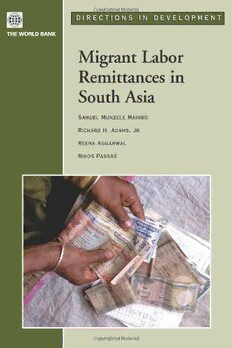Download Migrant Labor Remittances in South Asia (Directions in Development) PDF Free - Full Version
Download Migrant Labor Remittances in South Asia (Directions in Development) by Samuel Munzele Maimbo in PDF format completely FREE. No registration required, no payment needed. Get instant access to this valuable resource on PDFdrive.to!
About Migrant Labor Remittances in South Asia (Directions in Development)
According to a recent World Bank study of remittances, Bangladesh, India, Pakistan and Sri Lanka are all among the top 20 receivers of remittances, with estimated receipts of US$3.2 billion, US$8.4 billion and U.S$ 1.5 billion respectively. Migrant Labor Remittances in South Asia identifies and discusses the key issues affecting the remittance industry in South Asia. It examines the development and implementation of policies, processes, and infrastructure to foster a development-oriented transfer of financial resources between migrants in developed economies and their families in the region. Rather than duplicate previous remittances work, this title only focuses on the region?¦s distinguishing characteristics, namely: * A large migrant population of semi-skilled and unskilled workers largely concentrated in the Arabian Gulf countries, particularly Saudi Arabia and the United Arab Emirates. * The presence of dedicated public institutions and government financial incentives aimed at facilitating and providing incentives for temporary migration and remittance inflows * The existence of large state bank branch networks with immense potential for a more effective and efficient remittance financial market. * The widespread usage of trade related informal remittance channels by both legal and illegal migrants. The book is intended for policymakers who legislate and regulate the financial sector, as well as for researchers and providers of remittance services.
Detailed Information
| Author: | Samuel Munzele Maimbo |
|---|---|
| Publication Year: | 2005 |
| ISBN: | 9780821361849 |
| Pages: | 104 |
| Language: | English |
| File Size: | 0.761 |
| Format: | |
| Price: | FREE |
Safe & Secure Download - No registration required
Why Choose PDFdrive for Your Free Migrant Labor Remittances in South Asia (Directions in Development) Download?
- 100% Free: No hidden fees or subscriptions required for one book every day.
- No Registration: Immediate access is available without creating accounts for one book every day.
- Safe and Secure: Clean downloads without malware or viruses
- Multiple Formats: PDF, MOBI, Mpub,... optimized for all devices
- Educational Resource: Supporting knowledge sharing and learning
Frequently Asked Questions
Is it really free to download Migrant Labor Remittances in South Asia (Directions in Development) PDF?
Yes, on https://PDFdrive.to you can download Migrant Labor Remittances in South Asia (Directions in Development) by Samuel Munzele Maimbo completely free. We don't require any payment, subscription, or registration to access this PDF file. For 3 books every day.
How can I read Migrant Labor Remittances in South Asia (Directions in Development) on my mobile device?
After downloading Migrant Labor Remittances in South Asia (Directions in Development) PDF, you can open it with any PDF reader app on your phone or tablet. We recommend using Adobe Acrobat Reader, Apple Books, or Google Play Books for the best reading experience.
Is this the full version of Migrant Labor Remittances in South Asia (Directions in Development)?
Yes, this is the complete PDF version of Migrant Labor Remittances in South Asia (Directions in Development) by Samuel Munzele Maimbo. You will be able to read the entire content as in the printed version without missing any pages.
Is it legal to download Migrant Labor Remittances in South Asia (Directions in Development) PDF for free?
https://PDFdrive.to provides links to free educational resources available online. We do not store any files on our servers. Please be aware of copyright laws in your country before downloading.
The materials shared are intended for research, educational, and personal use in accordance with fair use principles.

